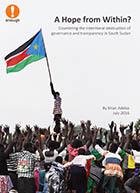
Note: Enough Project Intern Will Cullen contributed to this blog post. This blog contains excerpts from the full report.
Read or download the full report.
Today, the Enough Project released its latest report, “A Hope from Within? Countering the Intentional Destruction of Governance and Transparency in South Sudan” by Enough Project Associate Policy Director Brian Adeba. The report comes out on the heels of an early July outbreak of violence in South Sudan; a painful reminder of the need to encourage necessary institutional reforms with the aim of promoting transparency and accountability in the country.
As the African Union Commission of Inquiry noted in October 2015, the onset of conflict in December 2013 was sparked in part by the failure of the country’s institutions of governance to provide a system of checks to mitigate the power imbalances that contributed to the war. However, Adeba’s report notes that the perceived lack of capacity in governance institutions in South Sudan is actually the symptom of a much larger problem. Because governance institutions work at the behest of elite politicians, it can be in the interest of these politicians to disable these institutions and limit their ability to play their role in oversight, regulation, and providing checks and balances on other parts of the government – which is exactly what happened in South Sudan. Sustainable peace in the country will continue to be elusive unless leaders make profound and fundamental changes to establish accountability and end impunity.
For decades, the people in the area that is now South Sudan have been at war. As a consequence, institutions either never fully formed or were weakened or destroyed, and the development of a skilled labor force has been greatly hampered. At independence in 2011, the country had few viable institutions upon which to build a base for the new state. The strength and quality of institutions is still lacking. Overall, capacity development in the country still requires substantial investment, not only by international actors but also by South Sudanese actors especially. (p. 18/19)
“A Hope from Within? Countering the Intentional Destruction of Governance and Transparency in South Sudan” reviews the weaknesses of three of South Sudan’s governance institutions that are most critical to establishing accountability:
- The Anti-Corruption Commission
- The National Audit Chamber
- The Public Accounts Committee in the National Legislative Assembly
All three institutions face considerable operational challenges that have undercut their effectiveness in implementing their constitutional mandates. In the right political atmosphere and with the right political incentives for reform, these institutions could, however, exercise their roles effectively. With genuine political will for institutional effectiveness from top leadership, supported by pressure and incentives from international partners with South Sudanese leaders, these critical governance institutions could fulfill their mandates.
By nature, violent kleptocracies hijack governance institutions for the personal financial benefit of those within the ruling network and for the security of the regime. These kleptocracies use extreme violence, including mass atrocities, to maintain their hold on power. In this regard, South Sudan’s governance institutions were hijacked and the ability of these institutions to implement oversight functions was compromised. Wanton corruption by the political elite accelerated to unprecedented levels and further stymied the government’s ability to deliver services to the populace. In 2012, President Salva Kiir estimated that $4 billion was siphoned from the country’s coffers. (p. 2)
In order to ensure governance reforms guided by transparency and accountability in South Sudan, five key policy recommendations must be implemented by South Sudan, donor countries, and other key entities:
- Fully fund and staff the agencies responsible for governance to ensure long-term economic benefits.
- Boost civil society’s role in the public sphere by supporting civic bodies calling for transparency and accountability from diverse regions of the country.
- Tie external assistance to strict budget oversight, given depreciating oil revenues and fears of hyperinflation from the diversion and mismanagement of public funds. Donors should use a dual-key system, similar to that of Liberia’s Governance and Economic Management Assistance Program (GEMAP) to ensure transparency and accountability.
- Develop additional mechanisms for donor coordination and evaluation of decision-making using international standards. Donors should use clear and strictly-implemented anti-corruption benchmarks to prevent misuse of the procurement process or donor assistance related to equipment or training for the military and police.
- Support domestic enforcement and external accountability measures, including:
- The establishment of the Hybrid Court for South Sudan to prosecute atrocity and economic crimes.
- The use of authorities of the U.S. Treasury Department’s Financial Crimes Enforcement Network (FinCEN) to investigate the ways that the proceeds of corruption are laundered out of South Sudan.
- The imposition of additional targeted economic sanctions on individuals responsible for corruption by the U.S. and other donors, as well as the U.N. Security Council.

